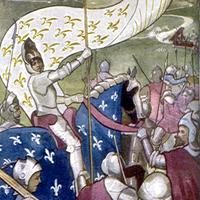19. Frederick Barbarossa
"When the hand Of Barbarossa grasped imperial sway, That name ne'er uttered without tears in Milan." —DANTE.
Although Godfrey de Bouillon died within the year, yet for the next half century the Christians kept Jerusalem from the attacks of the Mohammedans around them, till a time came of danger, and strong help was needed from Europe, and the Second Crusade was formed. It was led by the ruler of Germany and the King of France, for by this time the old kingdom of the Franks had disappeared, and our modern countries of Germany, France, and Italy existed separately.
Marching under the banner of the cross in this ill-fated crusade was young Frederick Barbarossa—as he was afterwards called, by reason of his red beard. Though the Crusade itself was a miserable failure, Barbarossa won golden opinions, and when his uncle died he became ruler of Germany.
Charlemagne had conquered the Lombards in the north of Italy and made their towns subject to Germany, but since his day a spirit of independence had grown up among these people, and for many years the German rulers had left them alone. But Barbarossa meant to assert his right over these northern cities of Italy, and he spent his life trying to suppress them, till he found out his mistake.
Ambitious of restoring the old rights, Barbarossa invaded Lombardy with "the arts of a statesman, the valour of a soldier, and the cruelty of a tyrant." He insisted on being crowned with the iron crown of the Lombards, and afterwards in Rome with the golden crown of the Empire. He left discontent behind him when he returned to Germany, and some years later, followed by a brilliant army of knights and nobles, he re-entered Lombardy. By all the passes of the Alps the German soldiers poured into Italy. Cries of despair arose from the freedom-loving cities when the people beheld this vast army. Milan, one of the chief towns, was besieged and starved into submission.
"Milan shall be a desert," Barbarossa declared, as he took his way back to Germany. But the brave endurance of the Milanese had roused the other towns in Lombardy to fierce rebellion. They now made a league, known to history as the Lombard League, to preserve that liberty which the emperor sought to destroy. They all agreed to rebuild Milan and to defend one another against Barbarossa should he come again.
He did come again. It was in the year 1176 that the German army met the army of the League at a place called Legnano, some fifteen miles from the new town of Milan.
In the centre of the Milanese soldiers was the sacred car of the city, a ponderous waggon drawn by four white oxen harnessed with red trappings. In the centre of this corrocio, as it was called, rose a figure of Christ with outstretched arms, supported on a globe, while above towered a lofty mast from which floated the banner of the Republic. An altar, a chest of medicine, bandages for the wounded, and a band of martial music completed the furniture of this quaint vehicle.
To the flower of the troops, under the name of the Company of Death, was entrusted its defence. Its presence inspired the Milanese with courage and enthusiasm. Its loss meant defeat and disgrace, for it was the very heart of the army. An old legend tells how, at the beginning of this battle, two white doves descended upon the out-stretched figure of Christ, as if in token that the blessing of Heaven was resting on the Italians. A tremendous charge of German cavalry made the Lombards give way, and the Germans pressed forward towards the corrocio in the centre of the army.
Nine hundred desperate patriots forming the Company of Death defended the sacred car. Seeing the Germans were gaining ground, fearful for the safety of their treasure, they suddenly knelt down and renewed their vow to God that they would perish for their country. Then, excited to a pitch of unwonted zeal, they charged the Germans. The attack was so sudden and so furious that the tide of victory turned.
Encouraged by such an example, the rest of the Italians rushed forward, and the Germans fled, defeated.
Barbarossa was now convinced of the power of the League, and made peace with the Lombards. His defeat proved of value to him, for it changed his stern attitude towards these people to one of mercy, and he turned the restless enemies of Lombardy into contented subjects.
This victorious struggle of the Lombards against Frederick Barbarossa is one of the landmarks of history, for it is the first entry of the people upon the stage of Europe.
Barbarossa was now an old man when he determined to join the Third Crusade, which was starting for Jerusalem. He reached Asia Minor, where he was stopped at a ford by a crowd of pack-horses. Impatient of delay, he, though now nearly seventy years old, set spurs to his horse and plunged into the water. The current was rapid, and the strong charger struggled against it in vain. In the sight of his army the old man was carried away and drowned.
Great was the regret of all. No ruler of Germany ever won a more lasting place in the affections of his people than Barbarossa.
The legends say that he is still sleeping, away among the Salzburg hills, and that his red beard has grown through the granite rock by which he sits. But some day, it says, when the ravens cease to fly round the mountain, he will awake and bring to his old country the dawn of a golden age.

